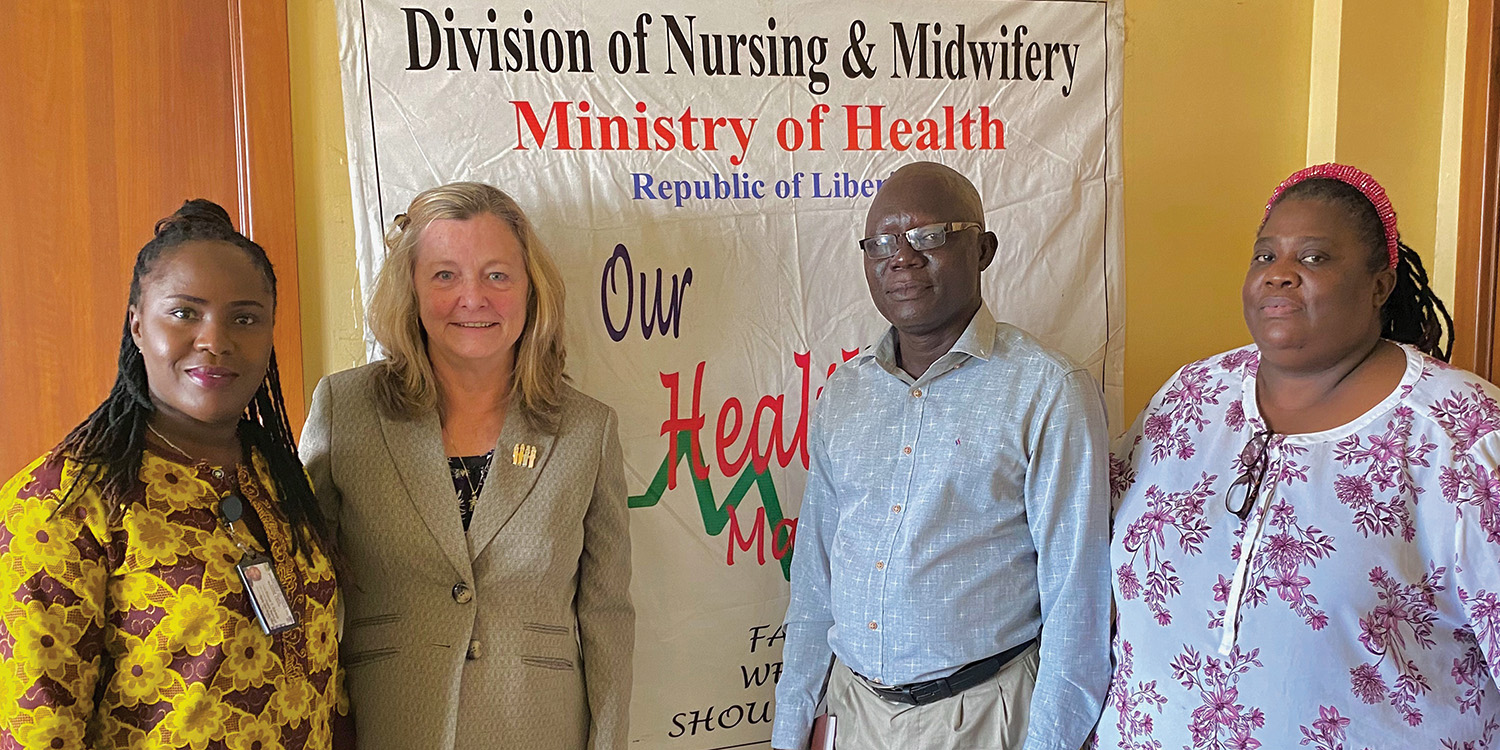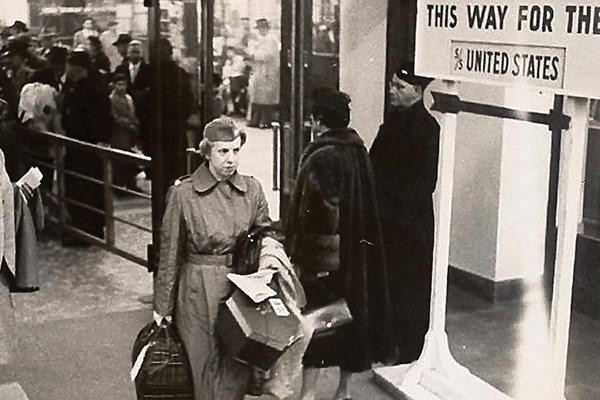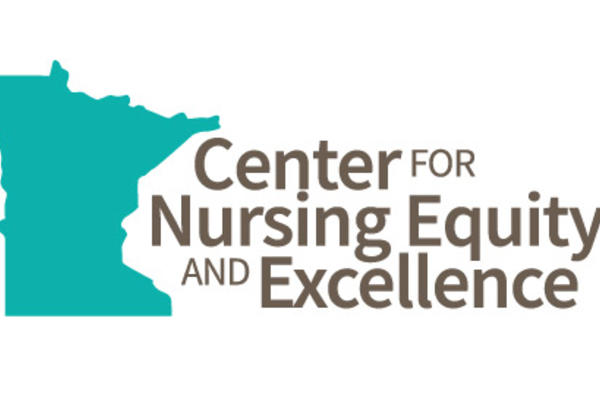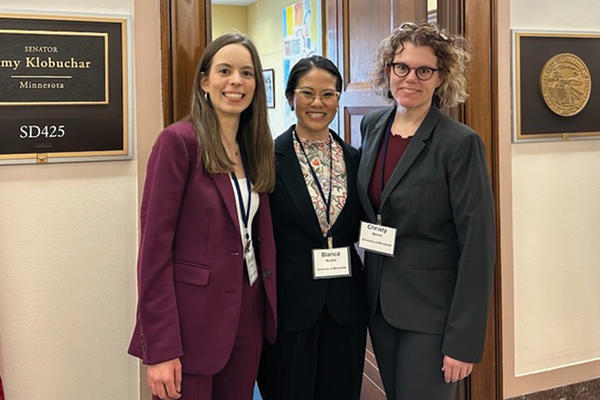Planning for a nurse practitioner program in Liberia
Nurse practitioners could fill gap in health care access
November 13, 2023
Brett Stursa

Above: Minister of Health CNO Diana Sarteh, Clinical Associate Professor Dorcas Kunkel, Edwin Beyan, and Deddeh Kesselly.
Clinical Associate Professor Dorcas Kunkel, DNP, RN, PHN, CNE, CPHIMS, received funding from the Global Programs and Strategy (GPS) Alliance as part of its initiative focused on the Sustainable Development Goals (SDG). The project Assessment of Relevancy of Nurse Practitioner Entry-to-Practice Competencies in the Primary Health Care Systems of Sub-Saharan Africa is assessing the relevancy of an existing set of core competencies for training and practice of advanced practice nurses in primary health care contexts, in particular family nurse practitioners in Liberia and for additional application in sub-Saharan Africa.
The project is building on what was learned in previous educational initiatives in Liberia and will provide information for governmental and non-governmental organizations and boards of nursing to begin to plan for context-relevant, graduate level family nurse practitioner programs in universities and colleges.
Filling gaps in care
Kunkel’s personal history in Liberia dates back to her childhood, as she spent seven years there as a child of Lutheran missionaries. In 2011, she helped launch a Master’s of Nursing Education program at Mother Patern College of Health Sciences in Monrovia as part of an expatriate team of faculty led by Edna E. Johnson, PhD, University of Connecticut faculty emeritus, who was engaged in health care recovery in Liberia after the civil wars. “The Master’s of Nursing Education program has prepared more than 80 Liberian faculty to be nursing educators and leaders who have contributed to filling gaps in national health care capacity after the civil wars,” says Kunkel, who served as visiting faculty and has continued to mentor students and graduates.
In 2021 Sister Barbara Brillant, dean of Mother Patern College of Health Sciences, approached Kunkel to gauge her interest in assisting in the development of curriculum for a family nurse practitioner program to fill in some of the gaps of primary care professionals and access.
“Primary care is very difficult to access because there are so few primary care providers,” says Kunkel. “A well-prepared nurse practitioner can monitor and care for families across the lifespan. There’s a real dearth of primary care providers over the whole country, but particularly rurally.”
Kunkel was awarded a 2022 Fulbright grant to spend six weeks assessing the possibility of establishing a nurse practitioner program in Liberia. With SDG grant co-PI Edwin Beyan, DHSc, RN, who graduated from the Master’s of Nursing Education program’s inaugural cohort and now coordinates the program, they began developing the curriculum framework. “It was important that we not just copy and paste curriculum from the United States. It just wouldn’t work because the context of care is so different. Liberia is a low-income country, and primary health care is the most inclusive, equitable and cost-effective way to achieve universal health coverage. The NP role needs to fit seamlessly into that system to be acceptable and to be sustainable,” says Kunkel.
They visited with the registrar and executive secretary for the Liberian Board for Nursing and Midwifery, Cecelia Kpangbala-Flomo, MPH, RN, and Diana Sarteh, MPH, RN, the chief nursing officer at the Ministry of Health, who were both very supportive. “We also visited sites trying to determine if there would be enough clinical opportunities, discussed how to improve nursing record keeping and how we might include simulations as part of clinical learning,” says Kunkel. “We looked at all of those to see if there would be a possibility of establishing a program, and we’ve determined that there would be if there was NP faculty to teach specialty courses and plan and supervise clinical learning.”
Assessing competencies in context
With the GPS Alliance grant, four half-day workshops are being conducted to introduce participants to advanced practice nursing concepts, and focus groups will be utilized to learn participants’ perceptions and opinions about the relevancy of nurse practitioners in family-centered practice across the lifespan for primary care delivery in Liberia.
They will also conduct a survey to assess an existing core set of nurse practitioner entry-to-practice competencies for their application in Liberia.
“We’re assessing the set of nurse practitioner competencies for the context in the country to be assured that the population would understand and trust that new kind of primary care provider, which is different than what they have now,” says Kunkel.
The grant also supported attendance at the International Council of Nurses Conference in July. “We presented a poster and it fostered the opportunity to meet together face-to-face and discuss advanced practice nursing role development with attendees,” she says.
Nurse practitioner program may launch in a few years
Kunkel expects this phase to be completed by December and is looking for funding opportunities to finish building the curriculum. She expects it will take another year or two before a nurse practitioner program will be launched in Liberia.
“A lot of really good things have happened in Liberian health care and education because of nursing and because of the increase in the capacity and expertise of nursing,” says Kunkel. “That’s a real testament to the hard work of Liberian nursing leaders, educators, and bedside nurses.”


